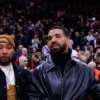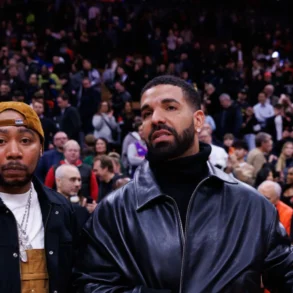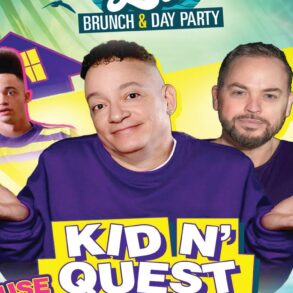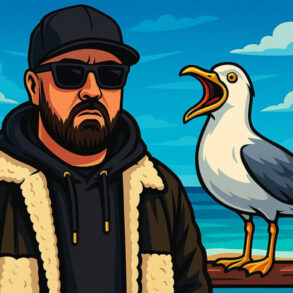DJ EFN had to only walk 10 steps to the podium.
He could’ve done it by himself — EFN was the person being honored with the key to Miami-Dade County, after all – but that’s not his character. So with the 11 friends that make up Crazy Hood Productions in tow, the Miami mixtape king sauntered through the halls of the Museum of Graffiti to the lectern, his crew fanning out across the room.
“Every success that I have individually I try to share with the crew,” EFN later explained. “The crew support throughout the years has been crucial to what I’ve done individually and as a company.”
That moment reveals more about who EFN — Eric F. Narciandi — than any episode of Drink Champs, the award-winning podcast of which he helped found and currently co-hosts. He’s hard-working. He’s humble. And arguably most important, he’s loyal.
Many of the people who walked with EFN to the lectern are the same people who supported him in 1993 when he had the idea to start CHP. Three decades later, the crazy Kendall kids have not only accomplished their goal of helping to shape Miami’s hip-hop scene, they have done so together, never forgetting where they came from along the way.
“For me, it’s surreal,” said Hector Cruz a.k.a. Heckler. “None of us ever thought that this day would ever be possible.”
“We were just wild kids,” added Michael Garcia aka Garcia.
How Crazy Hood Productions formed
The Miami of today looks far different than it did at the start of the 1990s — especially when it comes to hip-hop.
It’s easy to look at 2 Live Crew, Trina and Rick Ross and think that hip-hop always played a role in Miami culture, but that certainly wasn’t the case.
“We had this New York identity back then because the majority were New York transplants that made up the hip-hop community,” EFN recalled.
In the book “The History of Miami Hip Hop: The Story of DJ Khaled, Pitbull, DJ Craze, and Other Contributors to South Florida’s Scene,” author John Cordero referred to this identity crisis as “How Can I Be Down syndrome.”
“Symptoms include: an overwhelming desire to pretend one is from New York even though one has never been there, moving down here from New York and still acting like the local area code is 212 or 718, and saying over and over ‘Miami’s wack, I wish I was back in NY,” Cordero wrote.
As a kid born in Los Angeles who eventually settled in Kendall in the early 1980s, EFN never quite understood the affinity with NYC. Sure, it was the birthplace of hip-hop but that didn’t mean Miami was just Uncle Luke and booty-shaking. There was a distinct hip-hop culture; he had seen it with his own eyes.
“I started to live it without really knowing it’s hip-hop,” EFN recalled after receiving the key to Miami-Dade County. “We were breakdancing, rolling around with boomboxes, the slang is there, we’re doing graffiti — at least we’re trying to.”
EFN, however, always to gravitated to the DJ — ever since he first saw one at Super Wheels in Kendall.
“Seeing the DJ at the skating rink and seeing how he controlled the whole room, that’s what drew me,” EFN said, later adding the DJs featured in music videos on “MTV Raps” and “The Box” also played a role. “I was like ‘Wow, it’s like magic. He’s controlling all our emotions.”
Although EFN’s infatuation with hip-hop began after the debuts of Public Enemy and N.W.A. in the 1980s, it wasn’t until he began to attend Sunset High that he found like-minded people who shared his love of hip-hop. Many of those friends — like Paul Londono (Weird Thoughts), Adrian Enningham (Big Drain) and Orlando Cruz (Landi Lakes) — are still around today. As their 1993 graduation approached, however, the then-20-man collective did not know what to do.
“We all just really cared about music,” Heckler said.
“There was nothing else I was passionate about,” EFN added.
But EFN had an idea.
“Let’s unify, let’s create a brand and we’ll figure it out,” EFN said. “As long as the mission is clear — contribute to the local hip-hop scene — and in that, always carry the banner of our brand.”
Influenced by Luke Records, Wu-Tang Clan and the countless other self-made collectives, CHP came to life in 1993. The name was a product of EFN feeling a bit “crazy” for deciding to pursue a career in music at the age of 18 and the “hoodie” sweatshirts that are a staple of hip-hop culture.
“When he came up with the idea of CHP, we always believed in him,” Richard Bazile aka Dro, said. “He just always had a sense of business.”
CHP was originally supposed to be a record label — Heckler, Drain and Weird Thoughts had already formed a group called Da Alliance — but to self-produce an album in the mid-1990s was easier said than done. So EFN started to create mixtapes.
“The one thing that I saw there was an open lane for was mixtapes because we were getting all these mixtapes mostly from New York,” EFN said. At the time, that was the only way to get “all the new hip-hop that was coming out.”
EFN then had a decision. If he truly wanted to compete on the mixtape circuit, he would have to find a way to get new music before it trickled all the way down to the bottom of the map. And that’s exactly what he did: At least twice a year, EFN and the CHP crew would make the drive up to New York, grab what new releases they could find and circle right back to the 305 where he would create a tape that combined what they had found with singles from Da Alliance and whatever else was hot in Miami.
“For us to really make a dent in this, we got to be disciplined, we got to have a purpose, we got to do things outside the box,” EFN said. “That was always my approach: OK we don’t have money, we don’t have resources, we don’t have connections. There wasn’t much of a local industry propping us up. We’re from Kendall. We got a lot against us.”
And once “How Can I Be Down,” a hip-hop music conference that ran from 1993-1996 on South Beach before returning in 1999, started bringing the who’s who of the industry to CHP’s backyard, the crew kicked it into overdrive.
‘Can I get drop? I’m DJ EFN’
“‘We got to go to this as a crew,’” EFN recalled telling his CHP crew. “‘We got to be in uniform — T-shirts say ‘Crazy Hood’ with ‘Who’s Crazy’ on the back — and then we all got tape deck recorders and we’re getting drops from everybody.’”
Notorious B.I.G., Busta Rhymes and Big Pun are just a few of the names that the crew would get to shout-out EFN, Crazy Hood and even Kendall.
“Getting drops at that time from these artists and putting them on a mixtape from a kid from Kendall,” EFN recalled. “That was a game changer.”
Added Londono: “We were strategic, too. EFN had a plan. It was about seven of us, we all had recorders, and all seven us would spread out all over the street and we’re all EFN. One is down the street talking to Inspectah Deck saying, ‘Can I get drop? I’m DJ EFN.’ I’m up the street talking to Nas saying, ‘Can I get drop? I’m DJ EFN.’”
As the mixtapes began to create some buzz around CHP, EFN thought of another way to cement the brand: jams.
“We didn’t have any direction when we started the company. We just knew we wanted to do something,” EFN said. “The only thing to do at that time that was needed in the city was to throw a hip-hop event because there weren’t clubs we could go to to listen to hip-hop.”
The first jam, which took place at a body shop in Kendall, was a success — that is, until somebody started shooting. Almost instantly, police shut down the event and issued them a warning.
“‘If we ever see this CHP on anything else, we will shut you down,’” EFN recalled the cops telling him. “But the way things worked in that era, that made our event and our crew infamous.”
The jams didn’t stop. And neither did the mixtapes, which would soon become the backbone of the CHP brand. The mixtapes, which released between 1993-2010, garnered features from national names like Outkast, Redman, KRS-One and Wu-Tang but also local legends like Mother Superia.
“We were waiting for him to come back with that s—,” said Mother Superia, born Sonya Spikes. Everybody wanted to be on an EFN tape at that time. “He was the catalyst for the mixtape scene in Miami.”
For Garcia, who was a bit younger than most of the crew and joined later, CHP were hometown heroes.
“Growing up in Kendall, I used to see Heckler, I tried to get a demo to Paul, I bought a EFN tape before I met him,” Garcia said. “I dreamed of getting a record deal with Crazy Hood Productions.”
The brand expands
CHP eventually expanded into other areas: CHP Marketing and Promotions, the go-to firm for national brands like Coca-Cola and Def Jam that wanted to increase their footprint in Miami; Crazy Sounds Record Pool, a service that allowed him early access to music; Crazy Goods, a one-stop shop for all hip-hop clothing that was the brainchild of CHP member Eddie Gigs; Crazy Hood Film Academy, the production company behind the “Coming Home” documentaries which explore how hip-hop has shaped countries like Cuba, Haiti and Vietnam.
EFN even had a stint in the pirate radio world, a right of passage for many Miami DJs, as well as a manager for ¡Mayday!.
“It localized” the national hip-hop scene, said Ben Miller, otherwise known as Wrekonize, one of three members of ¡Mayday!. Wrekonize not only grew up on Crazy Hood mixtapes but was later featured on one.
“If you were in your mid-teens, those New York mixtapes felt like they were coming from a different planet. When you saw the Crazy Hood mixtapes, it was like ‘I can go down the street and be part of that.’”
Although Crazy Goods only lasted from 1997 to 2000, it’s impact extends to this very day as the brick and mortar was where the CHP crew first came into contact with Victor Santiago, known world over as N.O.R.E.
“N.O.R.E. is a big part of our family,” EFN said. “Connecting with him was a game changer. He was one of the first national artists to consistently work with us and we built that friendship early on in his career.”
‘If you couldn’t handle your liquor, you’re not a drink champ’
Spend any amount of time with the CHP crew and it’s clear why their friendship has endured.
The jokes are constant. They don’t take anything personally. And, like many men over the age of 40, they like to drink and talk smack. That “Drink Champs” emerged out of this camaraderie is no mistake.
“We all just joke with each other and support each other,” Weird Thoughts said. “And that never turned into an argument, hate or any animosity or hostility.”
Since CHP’s incorporation in 1994, the group has held weekly Wednesday meetings that, at first, differentiated them from other crews. Over time, the meetings began to evolve into an early version of Drink Champs with libations, laughter and a bit of ludicrousness. Even the name “Drink Champs” came from these meetings.
“In the crew we would say, ‘If you couldn’t handle your liquor, you’re not a drink champ,’” EFN recalled.
When N.O.R.E. made the move to Miami in the late 2000s, it was only right that he linked up with CHP, attending the weekly meetings and everything. CHP even helped N.O.R.E understand that Miamians respected more than just Uncle Luke; they did actually “love hardcore hip-hop.”
“These guys enjoy hip-hop just as much as us, just as much as New York, just as much as California, just as much as anywhere,” N.O.R.E. said in a 2018 episode of the “Family Ties” podcast.
The decision to do “Drink Champs,” however, took some time. EFN and N.O.R.E. would first come together for “Militainment Crazy Raw Radio” on SiriusXM satellite radio. While the show only ran from 2009 to 2011, EFN saw the potential. It took five years for him to convince N.O.R.E. – hip-hop podcasting didn’t necessarily have that cool factor in the early 2010s, according to EFN. But after the duo’s first episode in March 2016, they never looked back.
“In hip-hop, people weren’t used to be unfiltered,” EFN said. With “Drink Champs,” artists now had that opportunity.
“We caught lightning in a bottle,” he added. “What we really capitalized on was that it felt like they can relate to how unorthodox it was. This is me and my boys. that’s what we wanted to convey: conversations that we were having backstage, conversations at the barbershop, conversation in the studio.”
Nowadays, the award-winning podcast draws millions of viewers across the world. Its guest list includes multi hyphenates like Pharrell and Kanye West to hip-hop legends like Kool DJ Red Alert, DMX and Big Daddy Kane.
Despite the success, EFN has remained the same. In a sense, EFN’s calm matched with N.O.R.E.’s bravado has been a key part of the show’s success.
“A lot of people want to do this for fame, for recognition but since Day 1, EFN been true to the culture,” Dro said. “EFN has never been flashy. I don’t think I’ve ever seen him in some designer s—.”
Even here, EFN used his experience with Drink Champs to help the rest of CHP start their own podcasts including “Grumpy OGs” and “Father Hoods.” And while the CHP crew has dwindled over the years as people began to pursue other endeavors, the goal has always been for the entire crew to solely feed their families from the company.
“I would love for the brand so that everybody can have a business,” EFN said. “Everybody can splinter off and do their own thing so we can all make bread.”
Because that’s just who EFN is.
“He never forgets his connection that he has with the people, who are his people,” Mother Superia said.
To this day, she will get calls from her son or her brother who are ecstatic that EFN mentioned her on a “Drink Champs” episode.
“The loyalty, it means a lot to us because it’s a lot of time and work and energy. To stay the course and still rep your city? That speaks volumes.”
This post was originally published on this site be sure to check out more of their content.






